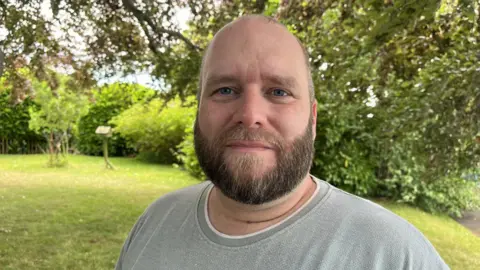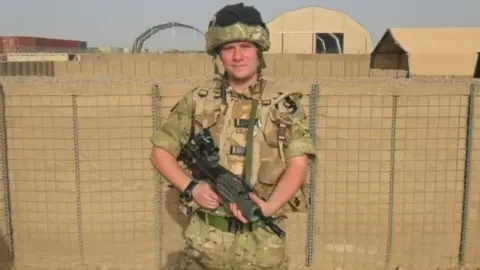RAF veteran urges early help for 'horrific' PTSD
 BBC
BBCAn RAF veteran is urging people to seek help for symptoms of post-traumatic stress disorder (PTSD) as early as possible.
Pete White served in Afghanistan in 2011 as a communications engineer, and part of his role involved monitoring video and images of dead soldiers and civilians.
The 38-year-old said he was "effectively watching people lose their lives in horrific ways", and left the armed forces in 2017 after a diagnosis of PTSD and depression.
Mr White, who lives in Newport in Shropshire, said it was "quite common" for people not to get help for the mental health condition until "decades" after.
Originally from Billingham in Teesside, Mr White joined the RAF in 2009.
After returning to the UK following service in Afghanistan, he said he "was feeling incredibly low, I was angry, I was losing sleep, I was having horrific memories of what had happened".
"It kind of ruined a lot of different aspects of my life."
 Pete White
Pete WhiteMr White said when he became a father in 2021, he found it "really difficult."
"When my son cried and screamed as kids will do, that would cause me to have flashbacks and see things from my past that were really troubling and upsetting," he said.
"There were times where I came quite close to not being here anymore."
According to charity Combat Stress, which provides treatment and support for UK veterans, on average it takes people 13 years between leaving the armed forces and seeking their help for mental health issues.
The mental health organisation said the majority of those they helped were veterans of the wars in Afghanistan and Iraq.
Mr White is also keen to emphasise that it is not just an issue facing veterans, describing PTSD as "quite insidious."
"When I talk about my symptoms, they sound obvious that something is wrong," he said.
"But actually, they're so sneaky and manage to weave themselves into the fabric of your life that by the time you get to the level of where I was, to you, it seems very normal."
Now, he is urging people to get help and support - either from charities like Combat Stress and Samaritans, or by going to their GP.
"The sooner we can say 'hang on a second, I went through this, I don't know if it's causing issues, but I should talk to someone about this,' that would be great," he said.
"As brutal and as impossible as it can feel sometimes, please don't give up."
If you have been affected by the issues raised in this story you can visit the BBC Action Line for support.
Follow BBC Shropshire on BBC Sounds, Facebook, X and Instagram.
